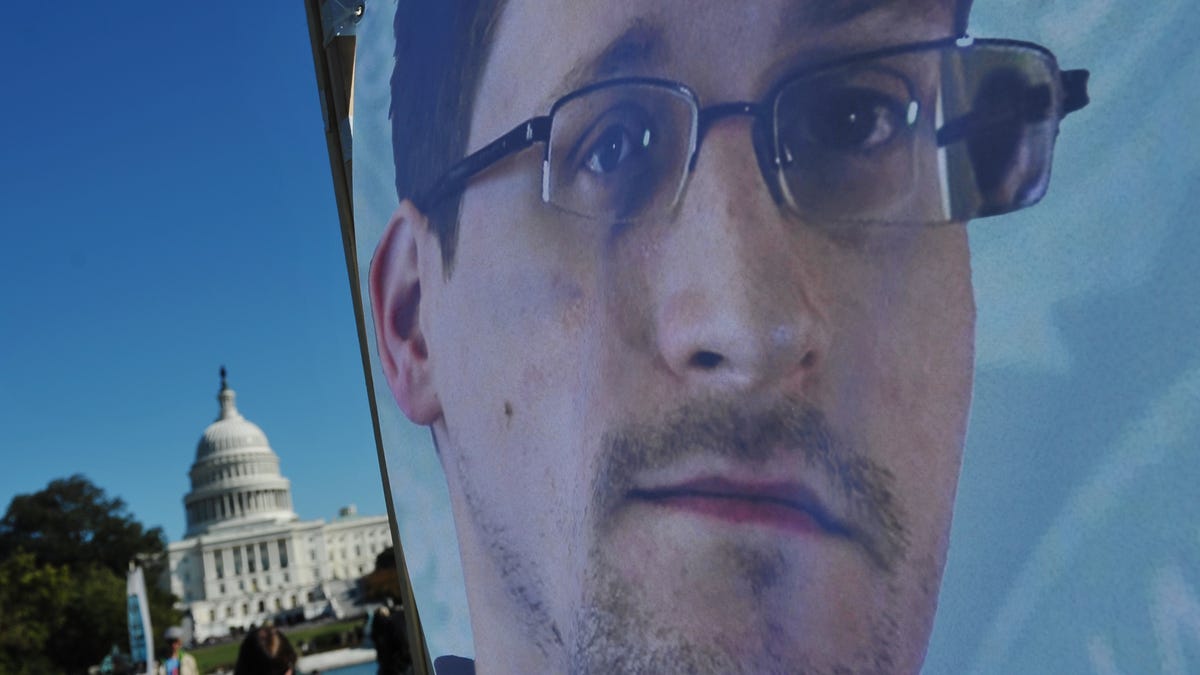Snowden says tech capabilities mustn't trump laws and values
NSA whistle-blower Edward Snowden says he "bet his life" that an open, societal discussion could lead to a better balance between the power of spy technologies and the power of democratic controls.

"We've learned that we've allowed technological capabilities to dictate policies and practices, rather than ensuring that our laws and values guide our technological capabilities."
So says Edward Snowden, who sent a statement to Foreign Policy on Wednesday night in lieu of attending the magazine's reception for those named to its "Leading Global Thinkers of 2013" list.
Snowden tops the list as a result of having leaked tens of thousands of classified NSA documents to journalists, thus touching off a global debate about the proper balance between national security and civil liberties -- as well as concern over the fate of the Internet itself. (Will it be an instrument of democratization and creativity? Or a giant spy tool?)
Call him hero or traitor, Snowden turns out to be a thoughtful crafter of statements. He leads off with a couple of lines designed to prompt knowing smiles. As readers may know, Snowden -- who's currently riding out a yearlong period of temporary asylum in Russia -- is wanted by US authorities under the Espionage Act, and officials in the States have also made questionable remarks about placing him on a kill list.
Here's his opener:
It's an honor to address you tonight. I apologize for being unable to attend in person, but I've been having a bit of passport trouble...As it turns out, revealing matters of "legitimate concern" nowadays puts you on the list for more than "Global Thinker" awards.
From there, Snowden makes several eloquent remarks about the issues surrounding surveillance, saying, at one point, that he "bet his life" on the idea that open discussion of the issue would lead to a "better balance" between the power of spy technologies and the power of democratic controls. (You can read the full statement below.)
Snowden may have topped Foreign Policy's list of thinkers, but when it came to Time magazine's Person of the Year award, he lost out to the pope. Time has been the butt of some ridicule over the decision, announced Wednesday. The title of the publication's Person of the Year Web page says, "Time picks the person who most influenced the news each year, for better or worse." And some people claim that in 2013, that individual was undoubtedly Snowden.
Also Wednesday, NSA chief Keith Alexander continued to cite the threat of terrorism in his defense of the agency's surveillance programs. In a hearing before the US Senate's Judiciary Committee, Alexander said, "We can't go back to a pre-9/11 moment." Some senators have questioned the terrorism justification while others have supported it. It remains one of the agency's key talking points.
Other remarks at the hearing included Sen. Sheldon Whitehouse's comment that ending the NSA's collection of phone-call data would essentially be "unilaterally disarming" the agency in an area where other countries' intelligence outfits are active. Sen. Chuck Grassley said that the NSA's location tracking, and other recent revelations, "call into serious question" whether current oversight mechanisms strike the right balance between safety and freedom.
Here's Snowden's complete statement to Foreign Policy:
It's an honor to address you tonight. I apologize for being unable to attend in person, but I've been having a bit of passport trouble. Glenn Greenwald and Laura Poitras also regrettably could not accept their invitations. As it turns out, revealing matters of "legitimate concern" nowadays puts you on the list for more than "Global Thinker" awards.
2013 has been an important year for civil society. As we look back on the events of the past year and their implications for the state of surveillance within the United States and around the world, I suspect we will remember this year less for the changes in policies that are sure to come, than for changing our minds. In a single year, people from Indonesia to Indianapolis have come to realize that dragnet surveillance is not a mark of progress, but a problem to be solved.
We've learned that we've allowed technological capabilities to dictate policies and practices, rather than ensuring that our laws and values guide our technological capabilities. And take notice: this awareness, and these sentiments, are held most strongly among the young--those with lifetimes of votes ahead of them.
Even those who may not be persuaded that our surveillance technologies have dangerously outpaced democratic controls should agree that in democracies, surveillance of the public must be debated by the public. No official may decide the limit of our rights in secret.
Today we stand at the crossroads of policy, where parliaments and presidents on every continent are grappling with how to bring meaningful oversight to the darkest corners of our national security bureaucracies. The stakes are high. James Madison warned that our freedoms are most likely to be abridged by gradual and silent encroachments by those in power. I bet my life on the idea that together, in the light of day, we can find a better balance.
I'm grateful to Foreign Policy Magazine and the many others helping to expose those encroachments and to end that silence.
Thank you.

